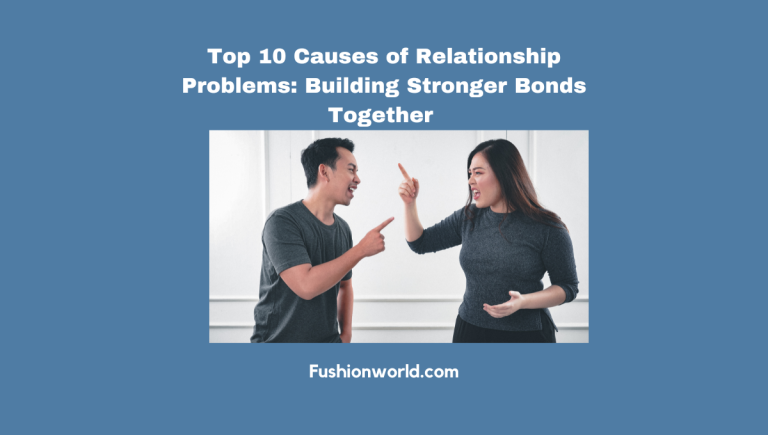The language of relationship is always a mystery and cryptic. Resolving and decoding this language needs a special understanding. The world may change, science can evolve but the concept of love is still cryptic and often old school. The tapestry of relationship is woven with the silks of love, complications, fights and difficulties. Understanding the fundamental elements that fortify these connections becomes the compass guiding us toward enduring and profound bonds
Relationships are intricate structures based on respect, love, and understanding. They can, however, also be vulnerable to a number of issues that could put stress on their foundation. Navigating and maybe resolving these problems requires identifying their causes. The following are the top 10 causes of relationship issues:
Communication Breakdown:

Communication is the cornerstone of any successful relationship. When communication fails, problems arise. From misunderstanding, trust issues and loyalty, every biggest problem begins when you fail to communicate and convey what you really feel.
Trust Issues:

Trust is the bedrock of a healthy relationship. Often trust issues have a deep traumatic past, and so people with such a past will take a long time to come out of it and build trust in someone. In relationships trust issues arise because of breakups, cheating and betraying.
Financial Stress:

Money matters often cause tension. Disparities in spending habits, financial goals, or unexpected financial burdens can strain a relationship. Open discussions and shared financial plans can alleviate this stress.
Lack of Intimacy:

Physical and emotional intimacy play vital roles in a relationship. Emotional distance occurs when you fail to acknowledge each other’s presence. Yes, one will not always be free enough to spend time with their loved ones amidst the busy schedule but just a single assurance like texting will build an emotional connection with your partner.
Different Expectations:

Divergent expectations about the relationship’s trajectory, commitments, or roles can lead to conflicts. Aligning and managing expectations is crucial for harmony.
Conflict Resolution Issues:

Disagreements are normal, but how they’re handled can impact the relationship. Constant arguing, poor resolving skills may build on the problems rather than solving them. In a relationship, each one has their own way of resolving problems. Instead of talking about the problems and blaming each other. One should talk about how to resolve it.
Personal Differences:

Differing personalities, values, or beliefs might initially attract partners, but they can later become sources of conflict if not handled with understanding and acceptance.
External Stressors:

Falling in love is quite easy but staying in love is a bit difficult. External factors such as stress, family problems, office issues, depression and many other things will be a catalyst to evoke problems in a relationship. So make sure you deal with them properly.
Lack of Quality Time:

Busy schedules or differing priorities can lead to neglecting quality time together. Spending meaningful moments strengthens the bond between partners.
Unrealistic Expectations:

Expecting a partner to fulfil all emotional, social, and personal needs can strain the relationship. Unrealistic expectations put undue pressure on the relationship.
FAQ About Top 10 Causes of Relationship Problem:
1: What effects does communication have on relationships? I
n relationships, effective communication is essential. Conflicts and unresolved issues are frequently the result of miscommunication that causes misunderstandings.
2. What makes trust so important in a relationship?
The basis of a strong relationship is trust. Trust can be destroyed by betrayals or dishonesty, which can lead to serious relationship issues.
3. What impact do money problems have on relationships?
Couples may become tense due to financial strain or disparities in their spending patterns, which can affect their dynamic and general relationship satisfaction.
4: What function does closeness serve in relationships?
Physical and emotional intimacy improves a couple’s relationship. Relationship strain and feelings of disconnection can result from a lack of intimacy.
5: What makes having different expectations in a relationship difficult?
Differing expectations regarding the course of the relationship or individual roles between partners frequently lead to arguments and conflict.
6: How does resolving conflicts affect the stability of relationships?
The dynamics of relationships and general happiness can be negatively impacted by persistent arguments that are not resolved or by the inability to settle disputes.
Conclusion:
In the complex landscape of relationships, several key factors often contribute to problems between partners. Understanding these causes is crucial for couples seeking to navigate their relationships effectively. Addressing these issues demands open communication, trust-building efforts, financial harmony, nurturing intimacy, aligning expectations, and mastering conflict resolution. By acknowledging these challenges and actively working to overcome them, couples can strengthen their bonds and cultivate healthier, more resilient relatioanships.

